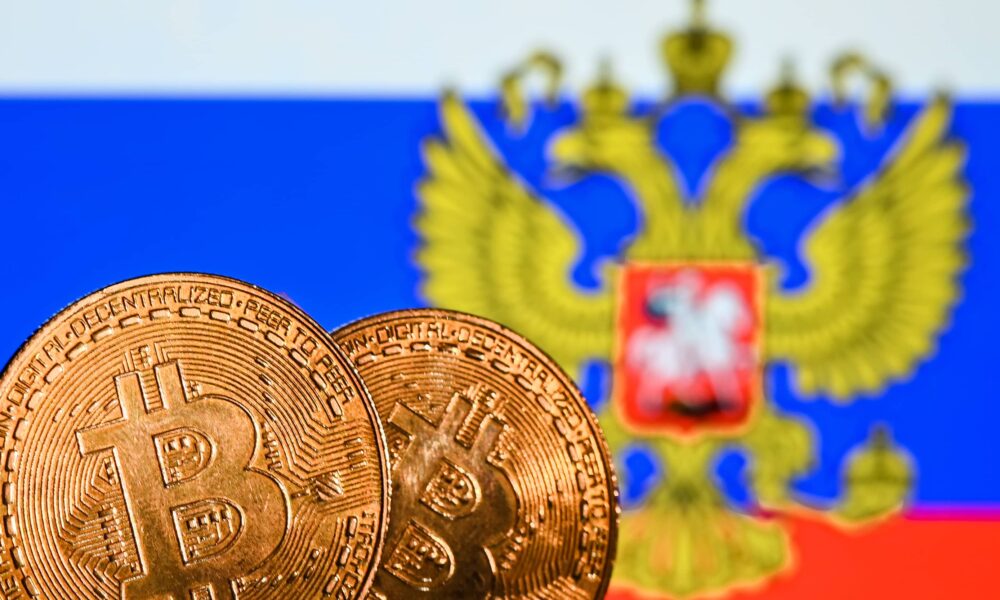News
Russia Considers Legalizing Cryptocurrencies as a Form of Payment Despite Sanctions

Illustrative image of two commemorative bitcoins seen in front of the national flag of Russia displayed on a computer screen.
Photo by Artur Widak | Photo by Nurphoto | Getty Images
Russia is considering legalizing the use of cryptocurrencies in international payments as the country faces ongoing financial pressure from Western sanctions.
The State Duma, the lower house of Russia’s parliament, will consider on Tuesday a bill allowing international payments to be made using cryptocurrencies, Elvira Nabiullina, governor of Russia’s central bank, said on Tuesday.
“Today the State Duma is considering a law that allows cryptocurrency transactions under an experimental regime,” Nabiullina said, speaking in the Federation Council, the upper house of the Russian parliament, the state news agency RIA Novosti reported.
The Duma is expected to approve the law on Tuesday, Reuters reported separately.
Russia’s central bank is also trying to move money across borders using cryptocurrencies: its chairman said that cryptocurrency-based payments will be made before the end of 2024.
“We are already discussing the terms of the experiment with ministries and departments, with companies, and we expect that the first such payments will be made before the end of the year,” he said.
Contacted by CNBC on Tuesday, the Russian Embassy in London was not immediately available to comment on the country’s plans to adopt pro-cryptocurrency legislation.
The central bank’s commitment to using cryptocurrencies as a cross-border payment method marks a reversal from the regulator’s previous stance on the technology.
In January 2022, the Russian Central Bank proposed to ban the use of cryptocurrencies for transactionsas well as the mining of digital currencies, citing threats to financial stability, citizen well-being, and monetary policy sovereignty.
This comes as rising tensions between Russia and the United States and its allies have led to countless sanctions against individuals and entities in Russia in retaliation for its attack on Ukraine.
The United States, the European Union and Britain are among the jurisdictions that have imposed sanctions on Russia since its invasion of Ukraine in February 2022. They have continued to increase pressure on the country, targeting President Vladimir Putin, Russia’s financial sector and countless oligarchs.
Separately, Russia is also considering implementing a digital version of the ruble.
Central bank digital currencies, or CBDCs, are different from cryptocurrencies. Unlike Bitcoin and other cryptocurrencies, which have no central governing authority, CBDCs are issued directly by a government and are designed to replicate fiat currencies in the form of a digital token.
Central Bank Governor Nabiullina said on Tuesday that the regulator will seek to abandon the pilot phase and move to large-scale implementation of the digital ruble starting in July 2025, Russia’s Interfax news agency reported.
Other sanctioned countries have often attempted to circumvent such financial restrictions through the use of cryptocurrencies.
North Korea has been accused on multiple occasions of raising millions of dollars in cryptocurrencies to fund various state programs and evade foreign sanctions.
North Korean state-backed hacker group Lazarus was behind massive heist Ronin Network — a blockchain that powers a popular non-fungible token (NFT) game called Axie Infinity. The hack saw cybercriminals steal more than $600 million in digital tokens, blockchain analytics firms Elliptic and Chainalysis previously said.
Cryptocurrency proponents, on the other hand, also argue that digital assets are a useful tool for combating illicit activity. This is because the networks that support them, called blockchains, are public and display a cryptographically secure and unalterable historical ledger of transactions.
